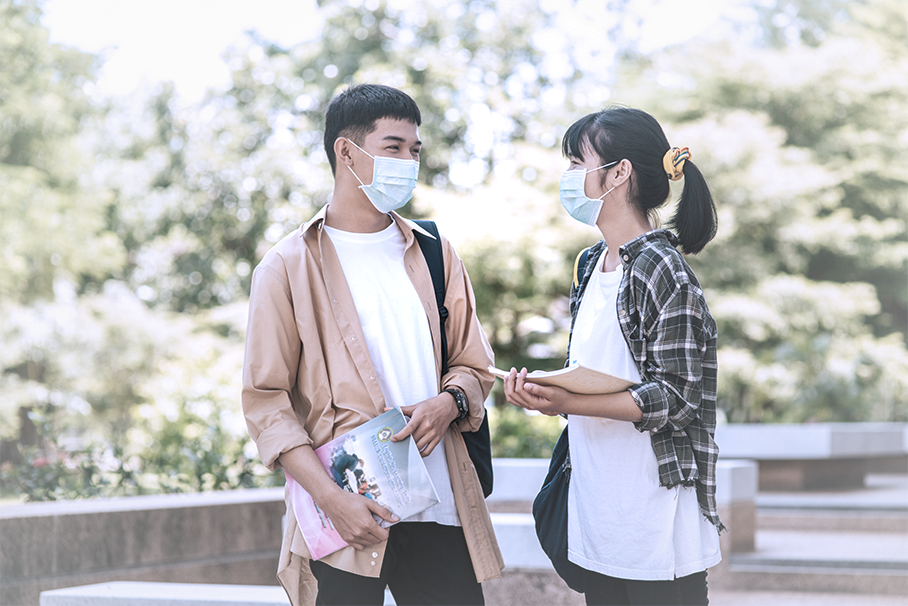Relationships between flu and COVID-19
The coronavirus SARS-CoV-2 has now been added to the annually recurring flu and cold viruses. These are different viruses that attack the respiratory tract and often cause similar symptoms. A laboratory test is required for a clear diagnosis. It is not possible to reliably distinguish between flu and COVID-19 based on symptoms.
The following table provides an overview of the typical respiratory diseases.
Key: +++ more common, ++ less common, + sometimes, / (very) rare
| Disease | COVID-19 | Influenza (flu) | Cold |
|---|---|---|---|
Pathogen | Coronavirus SARS-CoV-2 | Influenza viruses | >100 different viruses (and bacteria) |
| Onset of symptoms | If symptomatic, then often less abrupt | Starts quickly | Slowly over days |
Incubation period (typically) | 2-5 days | 1–2 days | Depending on the pathogen between 2-10 days |
| Immunity after infection or vaccination | Expected | Partially | Depending on pathogen type and immune status |
Vaccination available? | Yes | Yes | No |
Medications available? | Only non-specifically effective | Specifically effective | Only non-specifically effective |
When do I need to see a doctor?
Respiratory infections are usually self-limiting, meaning they go away on their own after a few days or two weeks at the latest. Only in individual cases may a visit to the doctor or even a hospital stay be necessary. The Robert Koch Institute (RKI) recommends a visit to the doctor for people who belong to the vulnerable group, e.g. people who suffer from a chronic illness, are pregnant, are younger than 2 years old or older than 60 years old. If you feel very ill or the disease is severe, you should go to a doctor's office. Typical warning signs are increasing breathing difficulties, persistent chest pain, tightness in the chest, high fever and confusion.
In addition, in the wake of the corona pandemic, some precautionary measures should be observed if you suspect you have been infected. You can find the details here.
Flu vaccination and coronaviruses
A flu vaccination can successfully prevent a large number of annual flu infections. From a medical point of view, however, there is no evidence that the flu vaccination offers direct protection against the coronavirus SARS-CoV-2. The possibility of contracting COVID-19 and flu at the same time is a life-threatening scenario, especially for risk groups. The RKI strongly recommends that they get a flu vaccination.
Simultaneous illness with COVID-19 and flu
A parallel infection with flu and coronavirus is possible. The body is weakened by an initial infection and therefore the probability of getting the second respiratory disease after contact with another pathogen increases. But this probability can be reduced by restricting contact and wearing a mouth and nose covering. Frequent hand washing also contributes significantly to better protection.
For the 2024/2025 season, the Standing Committee on Vaccination (STIKO) continues to recommend the flu vaccination, especially for people aged 60 and over, pregnant women from the second trimester, people with chronic illnesses and medical personnel. The resulting immunity can prevent infection with the flu viruses or at least weaken the course of the disease so that the immune system can concentrate on fighting the coronavirus. High-dose vaccines that offer improved protection will also be available for people aged 60 and over for the 2024/2025 season.
Side effects of the flu vaccination
Vaccinations usually have no side effects, but in individual cases mild symptoms can occur. This is known as a "vaccination reaction" and is a reaction of the immune system to the pathogen. This can be redness or swelling at the needle puncture site, muscle and limb pain, temporary tiredness and fatigue or a slight fever. The symptoms usually subside after a few days. No other side effects have been described for the flu vaccination so far. If you are unsure, you should contact your doctor.
The flu vaccination for pregnant women and children
The STIKO recommends that pregnant women get a flu vaccination from the second trimester of pregnancy. If the expectant mother has underlying chronic diseases, vaccination is even advisable in the first trimester.
Children can also get the flu, but they are much more likely to be affected by other cold viruses. Flu infections in children are usually less symptomatic than in adults and are more like a cold. Children over 6 months who are at increased health risk should definitely be vaccinated. A nasal live vaccine is available for children over 2 years.
In addition, relatives of a child who belongs to a risk group should generally be vaccinated. Their vaccination can further reduce the child's risk of infection. Vaccinating parents also has the positive effect that the vaccination means that parents are more likely to stay healthy and can continue to care for their child.
Flu vaccination and sporting activities
On the day of the vaccination, you should avoid intensive physical activity so as not to put additional strain on the body. Light exercise is harmless.
Flu vaccination in pharmacies
In some federal states, pharmacies offer the flu vaccination. It is best to find out whether your local pharmacy offers this service.
Digital solutions for a healthier world
The contents of this article reflect the current scientific status at the time of publication and were written to the best of our knowledge. Nevertheless, the article does not replace medical advice and diagnosis. If you have any questions, consult your general practitioner.
Originally published on






